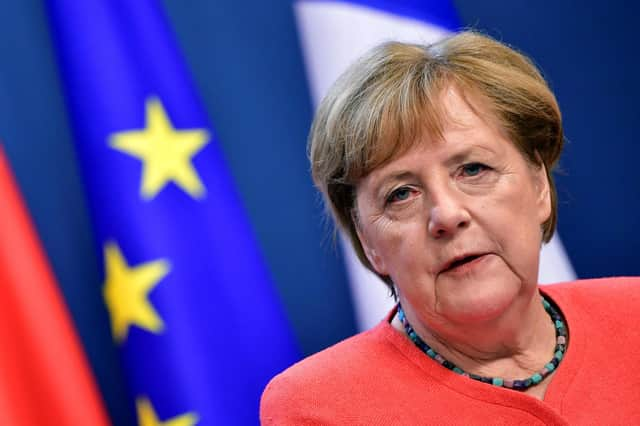Angela Merkel’s legacy lies in tatters as German U-turns accept realpolitik - Brian Monteith


As our World has become smaller through technological advances so that once far-off lands are but a mere three hours away and real-time audio-visual conversations can be held on our smartphones, so our sense of what is close and immediate to us has changed. A war in the Ukraine thus feels even closer to us than the last European war when Yugoslavia tore itself apart in the 1990s.
Whatever the validity of Putin’s paranoia about Ukraine’s pursuit of joining other former Soviet satellites as a full member of the European Union and possibly also Nato, it did not provide a scintilla of a pretext for military invasion of what is a sovereign country. There is only one aggressor and it is Vladimir Putin. Yet when one looks at the strategic chessboard it cannot be ignored the West in general and the German-dominated EU in particular has made it all too easy for the former KGB official.
Advertisement
Hide AdAdvertisement
Hide AdThree strategies central to Angela Merkel’s period as German chancellor have been exposed as opening the door to Putin’s opportunism. Merkel’s decision to abandon nuclear power in favour of relying on coal and gas has fatally undermined her country’s independence of action. When 60 per cent of your gas, 55 per cent of your coal and 35 per cent of your oil comes from a near neighbour that has a history of using military might you are leaving your own people to the threat of blackmail.
When at the same time your defence minister Ursula von der Leyen (now the EU Commission President) runs down your country’s defences so your submarines cannot put to sea, your tanks are immobile and your aircraft won’t fly you have put your country’s fate at the mercy of those with ill-intent.
And when this is to various degrees replicated around the European Union, with other countries even more reliant on Vladimir Putin being in a benign mood, it only takes the most obtuse threat to feed into the paranoia that says mother Russia is being encircled and he must strike first.
We have seen for decades how EU members of Nato have spent far less than the required two per cent of GDP on defence – with Germany committing 1.29 per cent compared to the UK’s 2.14 per cent. That’s $147bn less than Merkel should have invested in the five years since Russia invaded the Crimea.
The billions of German Euros used to purchase Russian energy imports have helped finance Putin re-equipping his military and build up healthy financial reserves from a surplus the Soviet Union never knew or enjoyed. And people wonder how Putin manages to get re-elected on his blend of authoritarian populism combined with cultural conservatism in a country that since 1991 has drawn upon the moral certainties from rediscovering its national religion that was previously suppressed.
Even after Putin’s tanks had rolled in European leaders were still resisting the realpolitik of their situation. In seeking to use economic sanctions against a leader who over the last ten years has built an economically self-reliant Fortress Russia any sanctions had to be comprehensive in approach and adoption. Yet Belgium wanted its trade in Diamonds to be exempted, Italy wanted to protect its export of luxury goods and worst – Germany did not want to expel Russia from the SWIFT bank messaging system that facilitates financial transactions (and especially very large amounts).
The last restriction in particular has the power to make all other sanctions enforceable and damaging. A trade in diamonds and handbags counts for nothing if Putin’s Russia can’t be paid or pay for them.
The usual suspects have attempted in partisan fashion to criticise Boris Johnson for not doing enough soon enough by way of sanctions and yet he was behind the scenes leading the charge on SWIFT and finding next to no support from European leaders.
Advertisement
Hide AdAdvertisement
Hide AdIronically, Germany’s behaviour put the whole Eurosystem at risk of a crash, for it would only have taken the sanctioning of Russian banks by the US Treasury and all US banks would not have been able to trade with European banks that still traded with Russian subsidiaries. A situation that happened when the US sanctioned Irans banks.
Fortunately, such high stakes have undoubtedly brought the German Chancellor Olaf Sholz to his senses – with three policy shifts in fewer than as many days. Germany has now agreed to expel “some” Russian Banks from SWIFT, it is now going to double its defence spending and will now establish new Gas storage reserves so it cannot be blackmailed so easily.
Angela Merkel’s period of power may be viewed as the good times but they were an illusion without foundations. Her legacy now lies in tatters. Nobody is saying now the EU prevented wars – it never did, indeed its policy towards Yugoslavia, its expansionism east – with a desire to create an EU army – have all contributed to making wars more likely.
Reappraising Britain’s defence capabilities must now move up the agenda. Thankfully, with Britain no longer constrained by working through the EU’s diplomatic inner sanctum the UK Government has more freedom to act in our national interests – making us and Europe far safer as a consequence.
Brian Monteith is editor of ThinkScotland and a former member of the Scottish and European Parliaments.
Comments
Want to join the conversation? Please or to comment on this article.
